As WA’s chief advocate for deaf and hard of hearing people, Rebecca Adam has a clear message for company leaders and government.
If you’re serious about “inclusion”, Auslan skills and deaf awareness must be part of what you do, the chief executive of Access Plus Deaf WA’s says.
New forecasts have put the economic benefits of Auslan — Australian Sign Language — at $380 million annually but the full potential will not be realised if Auslan isn’t designated as one of Australia’s official languages.
Auslan, which has its own grammar and syntax and is the primary communication for tens of thousands of users, has only community language designation, conferred in 1987.
This means that while interpreters are now commonplace at government events, Auslan has no legal recognition and advocates argue it has suffered from a lack of investment — and for users, it means a lack of opportunity particularly compared to New Zealand and the USA.
Serving on a jury is implausible here but not in the US, while study of Auslan to requisite interpreter level is dangerously low.
WA is home to about 9 per cent of the nation’s deaf population but the number of users of Auslan is thought to be underestimated because of confusion at Census questions about language. Just over 95 per cent of deaf children are born to hearing parents.
New research by think tank Per Capita suggests increasing use of Auslan is likely to have significant direct and indirect benefits to the Australian economy through higher levels of education attainment and workforce participation.
Report co-author Emma Dawson, executive director at Per Capita, said most Australians took for granted the ability learnt as children to speak in the language of family — and not being fluent could lead to dysfluency later in life.
Designation as an official language would not be a silver bullet, she said, but was an important step in the community valuing the language’s contribution.
“Formal recognition can lead to not just more government funding, but also to industry and businesses recognistion its value, in the same way they value other tools of diversity and inclusion,” Ms Dawson said.
A boost to employment participation alone is estimated at a $13.8m annually.
“The chances of a deaf person or their family attending a government or private sector ‘shopfront’ and being attended to by someone who can give them meaningful help or engage in professional exchange is a one in a hundred chance,” Ms Adam said.
“In the private sector, deaf shareholders, investors, shoppers, tourists and so on are both deserving of better service. They are a market opportunity usually overlooked.”
Ms Adam said increased visibility of Auslan during the pandemic meant Access Plus had been “swamped” by professionals, deaf people’s families and schools wanting training.
“What we need now is government and private sector decision makers to embrace (and fund) the challenge,” she said, adding governments were yet to provide “meaningful” programs for the deaf community and instead merely provided “a few grants”.
Ms Dawson called on businesses to lead the way in employing deaf and hard of hearing staff who used Auslan, which would in turn pressure the government to extend recognition.
“If we reposition (perception) away from it being an interpreting tool to a key part of the culture of the deaf community, corporations will recognise it as less of a disability issue and more of a primary communication tool,” she said.

